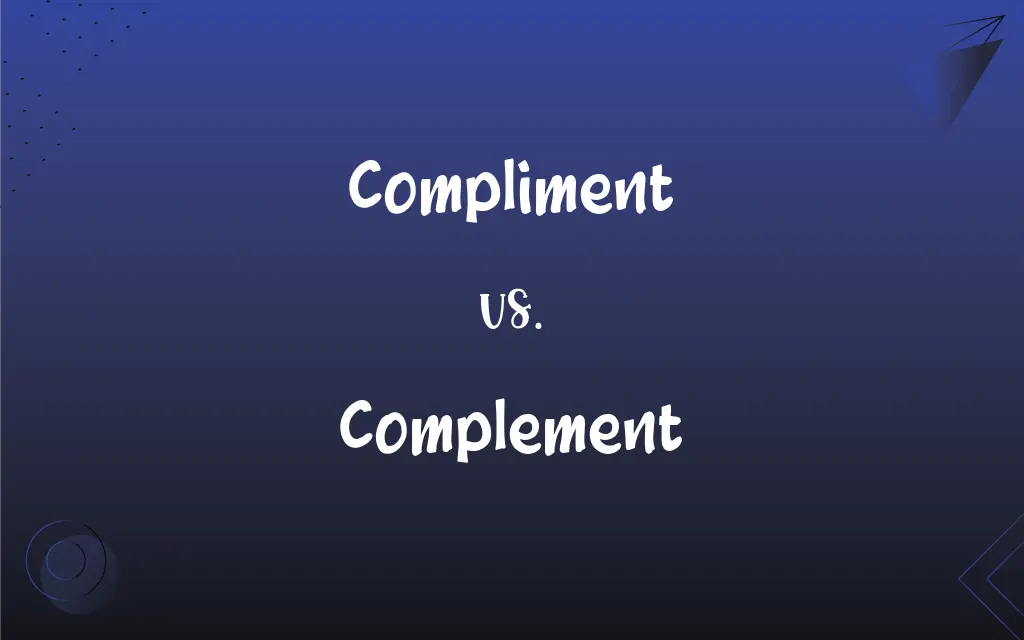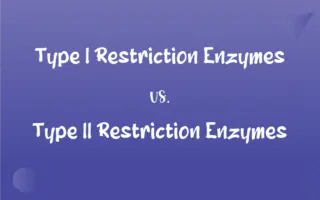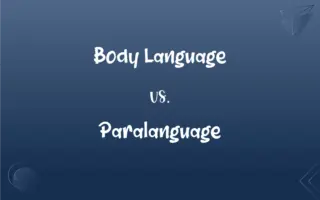Compliment vs. Complement: What's the Difference?
Edited by Janet White || By Harlon Moss || Updated on October 20, 2023
A "compliment" is a polite expression of praise, while a "complement" is something that completes or goes well with something.

Key Differences
"Compliment" and "complement" are commonly confused words in English because they sound similar, yet their meanings are distinct. A compliment refers to a kind or flattering remark made about someone or something. For instance, when someone says, "You have a beautiful voice," they are offering a compliment.
On the other hand, "complement" relates to things that enhance or complete one another. It's about pairing items or concepts that go well together, creating a sense of wholeness or completion. For example, when someone states that a wine complements a dish, they are suggesting that the two pair harmoniously.
To delve deeper, while "compliment" often arises in social contexts, signifying appreciation or admiration, "complement" frequently appears in various contexts, indicating enhancement or completion. The former focuses on praising attributes or actions, while the latter emphasizes synergy or cohesion between two elements.
Another distinction arises from their roots. "Compliment" derives from the Latin word "complementum," denoting "completion" or "filling up," reflecting its essence of wholeness. Conversely, "compliment" has roots in the Spanish word "cumplir," suggesting the act of fulfilling a courtesy or obligation.
In summary, while both words are integral to English vocabulary, they serve different purposes. "Compliment" denotes admiration, and "complement" signifies enhancement or completion. Recognizing their unique contexts and implications can aid in their accurate usage.
ADVERTISEMENT
Comparison Chart
Definition
A polite expression of praise or admiration.
Something that completes or pairs well with another.
Usage Context
Social interactions, expressing admiration.
Describing things that enhance or go well together.
Grammatical Function
Often used as a noun or verb.
Primarily used as a noun, sometimes as a verb.
Etymology
Derived from Spanish "cumplir".
Comes from Latin "complementum".
Examples
"You look wonderful."
"Salt complements pepper."
ADVERTISEMENT
Compliment and Complement Definitions
Compliment
A courteous expression of esteem or admiration.
I received a lovely compliment about my dress today.
Complement
Something that completes or goes perfectly with something.
The scarf is a perfect complement to her outfit.
Compliment
A note of admiration for someone's achievements or characteristics.
He gave her a compliment on her presentation skills.
Complement
The quantity or number required to make a group complete.
We have a full complement of staff today.
Compliment
A formal act of civility or respect.
The director paid her a compliment by personally thanking her.
Complement
Enhancing or emphasizing the qualities of another thing.
The sauce is a wonderful complement to the dish.
Compliment
An action or remark expressing praise or admiration.
His work received numerous compliments from the critics.
Complement
A thing that contributes additional features to something else.
The artwork is a complement to the room's decor.
Compliment
A gesture of goodwill or appreciation.
Sending flowers was a compliment to the host.
Complement
A word or word group that completes the predicate in a sentence.
In the sentence She is a doctor, a doctor is the complement.
Compliment
An expression of praise, admiration, or congratulation.
Complement
Something that completes, makes up a whole, or brings to perfection
A sauce that is a fine complement to fish.
Complement
The quantity or number needed to make up a whole
Shelves with a full complement of books.
FAQs
Is "you did a good job" a compliment or complement?
It's a compliment, expressing praise.
Can a dish have multiple complements?
Yes, many flavors or ingredients can complement a dish.
Are "compliment" and "complement" interchangeable?
No, "compliment" refers to praise, while "complement" denotes something that completes.
Can "complement" be used in a sentence about color?
Yes, e.g., "Blue and orange are complement colors."
Is saying "you complete me" a compliment?
Yes, it's a deep expression of admiration and affection.
How do you use "complement" in a math context?
In set theory, the "complement" of a set A refers to elements not in A.
Does "complementary angle" relate to the word "complement"?
Yes, two angles are complementary if they sum up to 90 degrees.
Can software and hardware complement each other?
Yes, good software can complement the capabilities of the hardware.
What's the opposite of complement in terms of color?
Opposite colors are often referred to as "complementary colors."
Which is used more in fashion, compliment or complement?
"Complement" is often used to describe items that go well together, but both terms can be used in fashion contexts.
Is "with compliments" a correct phrase?
Yes, it's often used to convey greetings or regards.
Is "complimentary" related to "compliment"?
Yes, "complimentary" means given as a compliment or free of charge.
Can businesses give compliments?
Yes, businesses often compliment clients or partners for their achievements or collaborations.
Do "compliment" and "complement" have similar origins?
No, "compliment" comes from Spanish, while "complement" is from Latin.
Can a person be a complement to another?
Yes, e.g., "They complement each other perfectly in their skills."
Which is more common, compliment or complement?
"Compliment" is more common in everyday conversation, but both have their places.
Are there fixed phrases with "compliment"?
Yes, like "pay someone a compliment."
How should I respond to a compliment?
A simple "thank you" is often appropriate.
What's the verb form of "complement"?
The verb form is "complement," as in "The wine complements the cheese."
Can music complement a mood?
Absolutely, e.g., "The soft music complemented the serene ambiance."
About Author
Written by
Harlon MossHarlon is a seasoned quality moderator and accomplished content writer for Difference Wiki. An alumnus of the prestigious University of California, he earned his degree in Computer Science. Leveraging his academic background, Harlon brings a meticulous and informed perspective to his work, ensuring content accuracy and excellence.
Edited by
Janet WhiteJanet White has been an esteemed writer and blogger for Difference Wiki. Holding a Master's degree in Science and Medical Journalism from the prestigious Boston University, she has consistently demonstrated her expertise and passion for her field. When she's not immersed in her work, Janet relishes her time exercising, delving into a good book, and cherishing moments with friends and family.































































